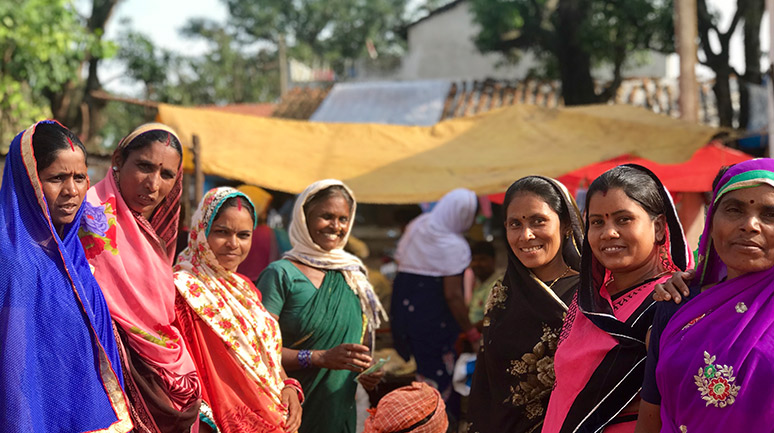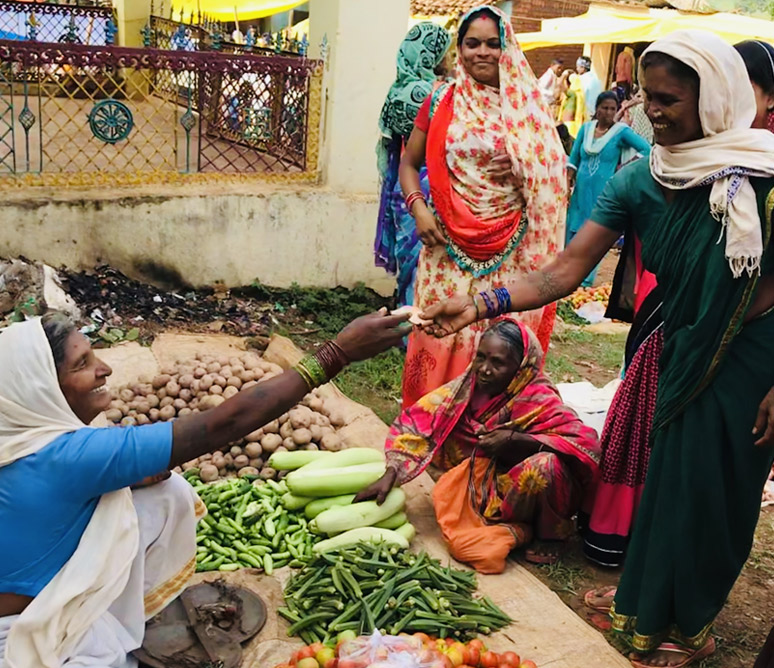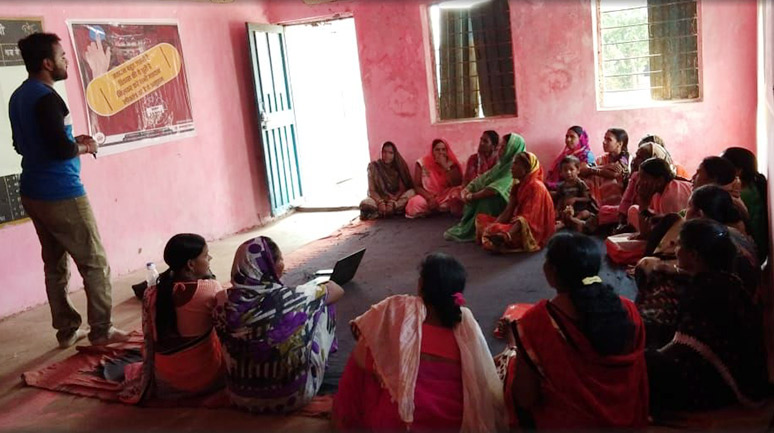The Pride of Bahmni VO: The Women of Samnapur


From being docile and acquiescent wives, the women of Samnapur recognize their own strength and capabilities, and step up into the hitherto male-dominated arena of bidding for the role of tax collectors in the market, much to the disbelief of the men of their families and village
They flitter like butterflies and sting like bees! Don’t you dare mess with their village organisation (VO)!
L et me introduce you to the women of Bahmni, currently beaming with confidence over their unexpected win. They exemplify what women can do when they realize their strength and collectivize. Indeed! Their collective and their self-confidence helped them beat the unchallenged since time immemorial, the misogynist and powerful local market contractor, in a bid.
They exemplify what women can do when they realize their strength and collectivize. Indeed! Their collective and their self-confidence helped them beat the unchallenged since time immemorial, the misogynist and powerful local market contractor, in a bid.
B ahmni is a village located in Samnapur block of Dindori district, Madhya Pradesh. It is home for people from diverse socio-cultural and religious backgrounds. It is inhabited by the Gonds, the Baigas, the Muslims, the Thakurs, the Pankas and so on. One of the highlights of Bahmni is the Wednesday local market, to which a group of vendors from nearby villages bring their bounty-laden vehicles and brighten the village. This market is an asset for the village and has been providing peasants with the necessities of daily life. Beneath this hustling rainbow and vibrant local trade, however, there was an extreme sense of discontentment among the vendors. And why wouldn’t they be displeased? They were subjected to constant torture, abusive language and extortion by the market contractor every week.
“Koe bhi didi ke paal-fatta fek detein rahish. Koe ka samaan la laat maar det rahin. Koe la nirakhnama se jyada wasooli let rahan. Okar thekedari me hamala bahoot chidh lagat rahan. Koe garib la maar deten rahe to bura lagat rahan hamla. (He would throw away the baskets and destroy some of our shacks. He would kick the things some of us had brought to the market. He would collect more tax than prescribed by panchayat. We were fed-up of his ill behaviour. He would even beat some of us up badly.)” said Gomati, one of the villagers.
Many women vendors are local residents of Bahmni and members of the Bahmni VO, which is a very robust institution. This VO is a group of 17 functional SHGs and was formed in 2011. The Samnapur team of PRADAN placed a great deal of emphasis here on collective grooming. The members of this VO have a very strong sense of self-worth. And, the bullying and abuse they experienced in the market was not at all acceptable to them. Anger at the injustice simmered in them day after day. They were waiting for the right occasion to light the matchstick and challenge the contractor. The day finally came!
Sukarti didi said, “Ghar wale la lawa lae hote bazaar, kahe mola purane thekedar. Ta main kahaun, ghar wale la kahe lawahun? lae la hohi ta mai khudehi na kharidhun. Mola zaroorat lagi ta moi khude la khareedbo. Tai thekedar hash, waise thekedar man ban sakash. Aaj ban ke ve dikhae din hunla (The contractor would taunt me, “Why don’t you ask your husband to buy this market?” In response I retorted, ‘Why would I ask my husband? I myself can own it. Like you, I can also be a contractor!’ Today I am a contractor!)”.
“Ek saal pahile hum mahila hun apna sapna dekhe rahan ki hum bazaar la khareedbo mahila ashtariya gram sangathan se. Ta wo saal nahi le payan. Hamla pata nahi rahan ki chupe bik gaesh bazaar O saal. Purana thekedar 1.2-1.3 lakhs phle se thamae det rahan sarpanch sacheewan la, tabahi boli nahi lagat rahae, chupe se bazaar bik jaat rahae. Aaso hatt Karen hum sarpanch ke sath e baar bazaar bikri ke baade se munnadi karwe lane, boli lagan lane. (Last year, we, the Bahmni Village Level Committee (VLC), dreamed of owning this market. However, the auction took place secretly and we could not participate. The previous contractor used to pay 1.2-1.3 lakhs to the Sarpanch and the Sachiv secretly, and the bazaar would be sold. This year, we (the VO) constantly kept up the pressure on the Sarpanch and ensured the public announcement of the auction and an open bidding process.)”
This year, we constantly kept up the pressure on the Sarpanch and ensured the public announcement of the auction and an open bidding process.)
E very year, a market contractor for the local market needs to be identified by the panchayat in Bahmni. Potential bidders are invited to bid and the highest bidder gets the contract for that financial year. The process entails making a prior announcement of the auction in the village; registration of candidates, to formalize their candidature, followed by an open, ascending price, bidding to arrive at the best price, The contractor is assigned certain roles and responsibilities. These include organizing and managing the market place, vendors and the local fair, and collecting tax every market day. For almost 50 years, Nawaab was the contractor. His actions and behaviour, however, has been exploitative to vendors all these years.
This was it! In 2019, the women of Bahmni were no longer ready to tolerate his ill behaviour. Since 2016, PRADAN, in partnership with ‘ We, the People’, had been engaging intensively with collectives here on issues pertaining to rights and citizenship. Following this, the collectives changed from being dissatisfied groups of women to well-equipped, well-informed groups of citizens, who believed in isonomy. The manifestation of this, in many facets of their lives, naturally gave them the necessary boost in confidence to identify and take up significant issues, related to their civic and political rights. Knowledge, understanding, skills and confidence added to their conviction about participating in the bidding process. They prepared their ground strategically. After the previous secret auction, the community regularly followed-up with the panchayat on when and how it was planning the next auction. They kept up the pressure on the panchayat to make the auction an open procedure so that any potential bidder could get the opportunity to participate.
The collectives changed from being dissatisfied groups of women to well-equipped, well-informed groups of citizens, who believed in isonomy.
Due to the collective efforts of these women, in 2019, a perfect ambience for the auction was created. Six bidders and many commoners participated. Most of the bidders were business persons or associated with some political group. The first bidder, Nawaab, was an eighty-year-old contractor-cum-business man, owning 100 acres of land in Bahmni. He was the son of Ahmed, a tax collector in the Malgujari system during the British regime. The second was Tulsi, a proxy bidder for Ashok Sharma, who was also the president of CAR. The third was Raghunath, a business man. The fourth was Sachin; a guest teacher in a nearby village. The last was the VO of Bahmni—a collective of women, who were mostly marginal farmers, farm labour, small shopkeepers or vendors. On behalf of the VO, Gomati, Reena, Sukarti, Meera and Madhukal were the bidders.
F inally, the big day arrived. The women marched to the auction hall on an emotional high of confidence and pride. There was quite a murmur when they entered. Their presence evoked irrational bidding behaviour in the contractors, especially Nawaab. As soon the crowd settled down, all four parties took their seats and the flooring amount was announced. An intense auction war ensued. The competitiveness among bidders was so high that in just four consecutive bids it reached 2 lakhs from the flooring amount of 1.1 lakhs. The women did not panic. Bidding prudently, they made safe leaps each time. As the auction progressed to 2.1 lakhs, Raghunath and Ashok Sharma became quiet. The women were face to face with Nawaab, who was not only intent on owning the market but also on preventing the women from having it. In his mission to outdo the women and to give them a beating, he overvalued the market price. The market, which earlier used to be sold at 1.2–1.3 lakhs touched 2.5 lakhs this time. The women soon figured out that the auction was progressing towards a winner’s curse situation. They made the wise decision to offer their last bid of 2.46 lakhs. Against their last bid, Nawaab offered 2.5 lakhs, which the women found completely irrational. This was beyond their valuation price. As the auctioneer was announcing the warning at this bid, the women exchanged glances of pointlessness and decided to withhold. On their withdrawal, Nawaab almost jumped in the joy of winning. In adherence to protocol, the contract was passed to him and he was given 24 hours to pay the amount in cash. Very arrogantly he made the commitment to pay in 24 hours in front of the whole crowd. His mind was so paralyzed with the joy of beating the women that he didn’t think that the commitment he made was not economically rational. Soon, he vanished and didn’t return to the panchayat to pay what he had committed. He was dismissed as a defaulter and his security money (Rs 10,000) was seized. The contract passed then to the next bidders—the women.
The efforts to make the auction an open procedure, participating in the bidding and winning it was a monumental achievement for the women.
T he efforts to make the auction an open procedure, participating in the bidding and winning it was a monumental achievement for the women. In order to seize the market from Nawaab, they had several rounds of VO meetings. They had been planning it since 2018; first to agree to participate in the auction of the market followed by planning for the same. They discussed extensively the plan for participating in the auction. Deciding on who would be their representative bidders, how they would respond to the all-men crowd bent on subduing them, setting the valuation price and the other nitty-gritties. They speculated that their participation would surely inflate the price. They were well-prepared with their optimal bidding strategy, taking cognizance of all practical situations. The women daring to step into the panchayat hall, to participate in the bid, outweighed everything. The moment they entered the auction hall, the aura of the room changed. People were initially dumbfounded by their presence, and took no time to pass hostile comments. The women were subjected to scornful glances, sarcasm, discouragement and disdain. They were acutely aware of the chauvinistic mindset around them; they didn’t buckle under pressure. Instead, they took bold and strategic control over consecutive bids.
The moment they entered the auction hall, the aura of the room changed. People were initially dumbfounded by their presence, and took no time to pass hostile comments.

“Beech me kae tho question humla ki hin mahila hoke boli lagae la aae haan. Hin hagri-padri lehin, bazaar khareedhi! Hinla saram nahi aaesh. Hin kahan se de pae paisa? Hum bolin hunla, paisa hain taav to aae hun! Mahila kahe nahi khareed sakkhi bazaar? Mahila hein to ka iska matlb hum kuwein ke ander rahenge? Kuwein ke bahar ve nikal sakte hain!! Aishe hunla jawab dae rahun, didi. (We were questioned, shamed and abused for daring to participate in the auction. They asked us with contempt, ‘Don’t you feel ashamed to be here? From where will you manage to pay this huge amount?’ And so on. We retorted, ‘We have money that’s why we are here! Why can’t women participate in bidding? We are women doesn’t mean that we would live in a shell. We can also step out!’)” Reena didi recounted.
T he women joyously accepted the contract, for which they had been planning for one year. They were given 48 hours to pay the sum of 2.46 lakhs to complete the procedure. It wasn’t a big amount for them. They had kept it in their VLC account but the panchayat wanted the whole sum in cash. So, they approached the bank for cash withdrawal; unfortunately the bank link didn’t work for 24 hours. They sweated blood day and night, running from door-to-door and SHG-to-SHG to collect money. From the collection of four SHGs, namely Durga, Mahalaxmi, Narmada, Devi Sharda and the VLC, they gathered 1.7 lakhs. They still had 85 thousand to collect. So, in such an extreme situation, Gomati, Reena and Sukarti decided to mortgage their jewellery, probably the only asset in their individual names. Such was the passion! Such is the leadership of the VO of Bahmni! Luckily their Federation, ‘Rani Durgawati Mahila Sangh’, supported them with 75 thousand. The remaining 10 thousand they managed from community members. The final procedure was thus completed on time.
Of course, they were happy with their win. They, however, were also aware of the socio-cultural restrictions and the patriarchal mind-set. When it came to collecting tax, they were a little hesitant to roam the market and get into dialogue with vendors, who are usually men. This was first time they were doing anything of this sort. It had always been the men who ran the market. How would vendors react to their presence in the market? One of the didis shared her first tax collection experience. She said, “I was so nervous when negotiating with vendors over tax that I could hear my own heart-beat and my nervous breath. I felt, as if I would faint then and there. The presence of other didis around me was like a strong pillar for me. We are becoming more confident every day and the vendors are cooperating too.”
Of course, they were happy with their win. They, however, were also aware of the socio-cultural restrictions and the patriarchal mind-set. When it came to collecting tax, they were a little hesitant to roam the market and get into dialogues with vendors, who are usually men.
“Ab mahile wasooli ve karegi? Bhai jab hum kharde ho kar k, bhare panchayat me boli laga sakte hein to hum wasooli kyu nahi kar sakte. Koe chori karne thodi jaenge jo hmko saram lagega! (‘Now women will collect tax too?’ the men taunted us. Brother! When we dared to bid in front of whole panchayat, why would we not collect tax?' We haven’t committed a crime that we should feel ashamed.)” Reena didi.
I n their wish to make this triumph purposeful, the women keep themselves available on every market day and don the role of the ‘thekedaar’. They are dealing with the backlash from the previous contractor strategically. After Nawaab lost this contract, he tried to portray a negative image of the women by showing a false tax chart, wherein the tax of placing different stalls was less than the tax prescribed by the panchayat and followed by women contractors. He did it for three consecutive market days. In response, the women lodged an FIR against Nawaab under the defamation Act.
In their wish to make this triumph purposeful, the women keep themselves available on every market day and don the role of the ‘thekedaar’.
“Report daike, nakal lae ke paper out karwa daen hum hunk galat nirakhnama ke khilaaf. Tabse shaant haan. Lagaataar 3 bazaar la pareshan kareesh hun humla (He disturbed us for 3 consecutive market days. So, finally we took a copy of his false tax sheet and logged a complaint against him. Since then, he is quiet)”, Madhukala didi.

With great pride, they now proudly introduce themselves as Thekedar Sukarti, Thekedar Madhukala and so on...


7 Comments
Very well written. It reflects how attached you are to the cause of women. They educating and organizing themselves to break the shackles of patriarchy.
Amazing, really inspiring.
Great work Pallavi
It’s incredible to see the real change done in the lives of residents of Samnapur by their own appetite for ownership, ability to stand against unfair practice and able mentorship of PRADAN field team.
It’s these kind of changes that shape up into a large scale change in socio-economic functioning – much needed for rural and interior regions of rhe country.
Congratulations Pallavi for driving the change and sharing with the world. Keep doing good work.
Such instances should be part of curriculum to enthuse future leaders. The tireless effort and dedication behind such contribution leading to meaningful outcome provides confidence and motivation to mobilize others.
Amazing!
This is incredible story of women leadership portraying the power of unity and self development by women. The approach of PRADAN towards community development being participative enables the VOs to drive their strength shaped by their own vision.
It was powerful initiative made by women thekedaars 🙂
Excellent work. My heartfelt appreciation!!